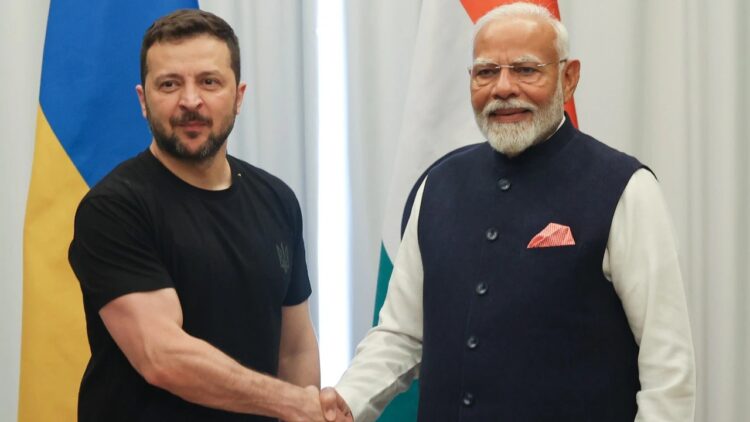In a bid to support a peaceful resolution to the ongoing Russia-Ukraine conflict, Prime Minister Narendra Modi reaffirmed India’s commitment to dialogue and diplomacy during a meeting with Ukraine President Volodymyr Zelenskyy. Following this, India dispatched a senior official to Switzerland for the two-day Summit on Peace in Ukraine, which commenced on Saturday.
Representing India, Pavan Kapoor, Secretary (West) in the Ministry of External Affairs, arrived in Burgenstock to participate in the discussions hosted by Switzerland President Viola Amherd. The summit started a day after G7 leaders in Italy approved a $50-billion loan to support Ukraine, using interest earned from Russia’s frozen central bank assets as collateral.
In her opening statement, President Amherd highlighted three key topics: nuclear safety, food security, and the humanitarian dimension. With Zelenskyy beside her, she emphasized the value of contributions from countries with experience in conflict resolution. “It is important that the conference on peace in Ukraine is taking place and that it has found so much high-ranking, broad support,” she said.
Describing the Russia-Ukraine war as “unprovoked,” Zelenskyy underscored the unprecedented representation at the summit, with delegates from all continents. He stated, “The views, the ideas, and the leadership of each nation are equally important to us, and whatever is agreed upon at the summit today will be part of the peacemaking process and the restoration of the UN Charter’s full force.”
The summit, attended by approximately 100 delegations, including 57 heads of state and government, notably excludes Russia. US President Joe Biden, who attended the G7 summit, sent Vice President Kamala Harris in his stead. On the eve of the summit, Russian President Vladimir Putin reiterated Russia’s demands, including Kyiv dropping its NATO ambitions and ceding four provinces to Moscow, which Ukraine swiftly rejected.
China’s absence, requested by Moscow, has also cast a shadow over the conference. Zelenskyy accused Beijing of aiding Moscow in undermining the gathering, an accusation China’s Foreign Ministry denied.
Before the summit, Prime Minister Modi met Zelenskyy, reiterating India’s support for a peaceful resolution. Modi described their meeting as “very productive” and emphasized India’s belief in a human-centric approach to peace through dialogue and diplomacy.
The Ministry of External Affairs reported that Modi and Zelenskyy exchanged views on the situation in Ukraine and the Summit on Peace. Zelenskyy congratulated Modi on his election victory and discussed bilateral relations, including agricultural technology and the Black Sea transport corridor for sunflower oil exports to India.
India, balancing strategic ties with Moscow and a reliance on Russian defense supplies, sent a Secretary-level official to the conference. India has also been purchasing Russian oil at discounted prices to mitigate the impact of rising oil prices. Zelenskyy had previously sought India’s support for his 10-point “peace formula,” calling for the withdrawal of Russian troops, the release of prisoners, and guarantees on nuclear safety and food security.
India has provided humanitarian aid to Ukraine, including 117 metric tonnes of supplies and financial assistance for school reconstruction in Kyiv. Despite not explicitly condemning the Russian invasion, India has called for an international probe into the Bucha massacre and expressed concern over nuclear threats. At the UNSC, India has maintained a nuanced position, abstaining from votes against Russia on several resolutions.

















Comments